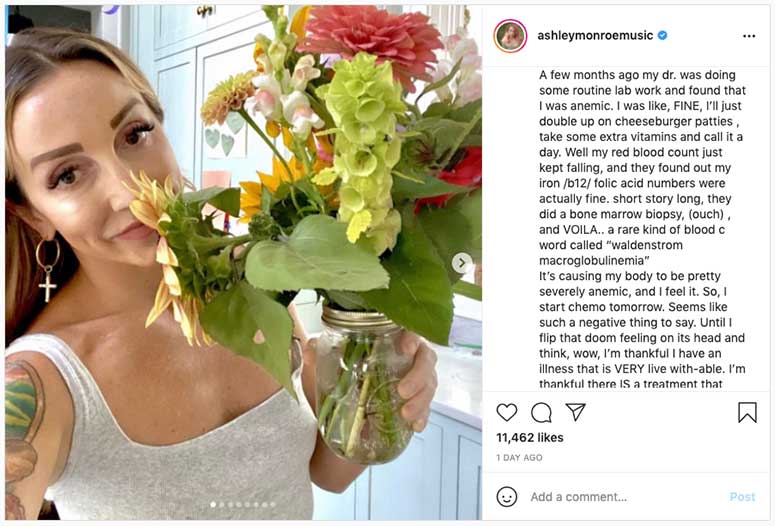Pistol Annies Singer Shares Rare Blood Cancer Diagnosis
Waldenström macroglobulinemia, or WM, is a rare blood cancer that is diagnosed in an estimated 1,000 patients annually in the United States. Country singer Ashley Monroe recently shared on Instagram that she is one of them.

“It's causing my body to be pretty severely anemic, and I feel it," the 34-year-old Pistol Annies band member said of the disease that was discovered following a bone marrow biopsy. She added that she was scheduled to begin chemotherapy immediately.
According to Dr. Hayder Saeed, a hematologist at Moffitt Cancer Center, WM is a type of indolent lymphoma that is asymptomatic in many patients and often only discovered during routine blood work. He said that it is usually found in older Caucasian males, but it’s not exclusive to that population.
“The symptoms in general are related to how the disease behaves,” Saeed said. “Cancer cells will either invade the bone marrow and other organs and cause low blood counts or enlarged lymph nodes. This cancer also produces an abnormal protein in the blood that can cause the blood to thicken and cause blockages in the blood vessels of the heart, lung and brain, which is called hyperviscosity.”
In her post, Monroe explained that she learned she was anemic after some routine blood work earlier this year, and doctors said her red blood cell count “kept falling.” She added that with a treatment plan in front of her, she feels hopeful that her condition is very “live with-able.”
Treatments can vary by case and is dependent on symptoms, Saeed said.
“Some patients with minimal amount of the cancer that is asymptomatic can be watched,” he said. “Ultimately, the disease will progress to the point of therapy, which can include immunotherapy, combination immunotherapy and chemotherapy, or targeted chemotherapy.”

There is not a lot of data on survivorship for these patients, mostly because of newer treatments becoming available. But Saeed said that the median survival rate is 12 years, which is encouraging.
“It’s important to remember that there is a subgroup of patients with high-risk features that may have shorter survival rates of around five years,” Saeed said.
Monroe appears to be in positive sprits. She posted that she is “thankful there is a treatment that actually works to fight what is causing harm to my body.” She also asked for friends and fans to pray for her “during this super weird chapter of my life."



